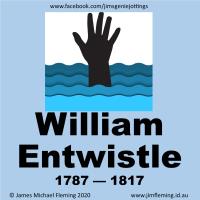JMF genealogy

Person Page 6,515
William ("Edward") Entwistle
b. 27 November 1787, d. 24 January 1817
Person Exhibits

Logo William Entwistle 1787
Birth
William ("Edward") Entwistle was born on 27 November 1787.1,2,3 He was baptized on 29 December 1787 at Emmanuel in Holcombe, Lancashire.1,2
Parents
| Father | Henry ("Harry") Entwistle (b. 10 March 1766, d. 17 April 1819) |
| Mother | Martha Jackson (b. 5 August 1769, d. 22 February 1828) |
Family life
William ("Edward") Entwistle and Ann ("Nuttal") Yates were married on 30 March 1807 in Bolton.4
Children with Ann ("Nuttal") Yates (b. 1784, d. 11 August 1871)
| Daughter | Peggy Entwistle (b. 13 March 1808) |
| Daughter | Alice Entwistle (b. 19 May 1811) |
Residence information
William ("Edward") Entwistle emigrated on 4 June 1812 from England. He sailed aboard the convict ship Indefatigable which he had joined on 9 May. His ship sailed with convict ship Minstrel and arrived at Rio de Janiero on 29 July. They left that port on 11 August in the company of both Minstrel and another convict ship, Archduke Charles (from Ireland). He immigrated on 19 October 1812 to Hobart, New South Wales, Australian Colonies. The Indefatigable was the first ship to sail directly to Hobart from England. Only one prisoner died on the voyage (from 199 who embarked). One of the other convicts on board was Michael Howe, who is recorded in history as the last and the worst of the bushrangers of Van Diemen's Land.5,6
Involvement in crime
William ("Edward") Entwistle was sentenced to 7 years transportation for larceny in July 1810 in Lancaster, England, United Kingdom.7,8 He was escaped from gaol in August 1810 in Salford, Lancashire. He escaped with James Green who had been sentenced on the same day in 1810. The court recompenses Constable Joseph Nadin the sum of 23 pounds 7 shillings and sixpence for costs that he had incurred in their pursuit. Since his daughter Alice was born in May 1811, he must have been free by about mid-August 1810.9 He stole a bay mare from James Pierpoint on 19 April 1811 in Warrington, Lancashire.3 He was arrested on 5 May 1811 in Northallerton, Lancashire. Before Constable William Warre could get him into the lockup, he escaped3 He was re-arrested on 6 May 1811 in Thirsk. William Entwistle was in possession of a watch, a pocket book (wallet) and 5 shillings in silver and a steel file10 He was placed on trial for horse stealing and returning from transportation on 31 July 1811 in York. After the prosecution's evidence was presented, William Entwistle made no defence3,10,6 He was found guilty and sentenced to death on 10 August 1811 in York.10,11 He was repreived from the death sentence on 17 August 1811 in York. The death sentence was replaced with a sentence of transportation for life10,11 He was granted an absolute pardon on 25 May 1816 in New South Wales. Absolute pardons excused convicts from serving the remainder of their sentence. These convicts then enjoyed the same rights as free people, including the right to return to the UK or Ireland. It was quite unusual for a convict to be granted an absolute pardon. Most pardons were conditional. William had served just 5 years of a life sentence.12
Working life
- On 30 March 1807 William ("Edward") Entwistle was a cotton spinner in Bolton.4
Death
William ("Edward") Entwistle died from drowning on 24 January 1817 at age 29 at New River in Port Dalrymple.13
Citations
- [S1340] Lancashire Online Parish Clerks, Index: Baptisms Entwistle x 6 at Edgeworth, (Lancashire Online Parish Clerks, 11 Aug 2020.)
- [S1491] Baptismal Record: Entwisle, William 1787, No Drm/2/64, (29 Dec 1787), Lancashire County Council Archives, Preston, Lancashire
- [S1496] William Entwistle, Criminal Quarter Sessions Records: York William Entwistle 7 Jul 1811, (York: York Libraries and Archives), 7 Jul 1811, Y/ORD/1/1 - 1800-1819
- [S1490] Marriage Certificate, William Entwistle and Ann Yates, 30 Mar 1807, General Register Office, England, London. St Peter's Church, Bolton-le-Moors, Lancashire.
- [S1499] William Entwistle, 1812 Convict Indent: Entwistle William, (Kingswood NSW: NSW State Archives), Arrived 19 Oct 1812, Friendship 2. Master: John Cross.
- [S1150] William Entwistle, Convict Muster 1816 VDL: Entwistle William, (Kingswood NSW: NSW State Archives), 1816. HO 10 piece 3.
- [S1493] William Entwistle, Criminal Court Register: Lancaster William Entwistle Jul 1810Home Office, England), July Assizes 1810, HO27, piece 6, page 130
- [S1494] William Entwistle, Criminal Quarter Sessions Records: Manchester William Entwistle Jul 1810Lancashire Record Office), July Assizes 1810, RB 37
- [S1495] William Entwistle, Criminal Quarter Sessions Records: Manchester William Entwistle 1811Lancashire Record Office), 1811, RB 38
- [S1497] Various newspaper articles, York Herald and Lancaster Gazette, York, 31 Jul 1811 and others.
- [S1498] William Entwistle, Criminal Court Register: York William Entwistle Jul 1811, (Kew: The National Archives), July Assizes 1811, HO27, piece 7, page 309
- [S1501] William Entwistle, Absolute Pardon, (NSW: Colonial Secretary), 25 May 1816, 4/4430, reel 774, roll 1250, page 102
- [S1502] Hobart Town, The Hobart Town Gazette and Southern Reporter, Hobart, 1 Feb 1817, page 2.
| Context | Convicts |
| Last Edited | 16 February 2021 |